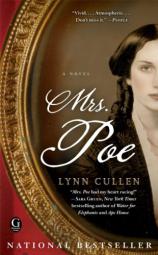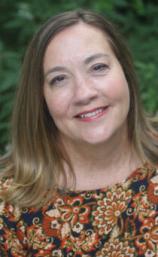Author Talk: October 3, 2013
Lynn Cullen is an award-winning author of both adult and children’s fiction. Her latest novel, MRS. POE, provided her with the opportunity to reflect on the “writing life,” and to create a character who experiences the same “joys and terrors” of the experience as Cullen herself does. MRS. POE is the story of poet and single mother Frances Osgood and her illicit love affair with Edgar Allan Poe at the height of his career. In this interview, Cullen discusses the strange coincidence that led her to write about Frances and Poe --- one that was both welcome and appropriate, given the tentative climate of her professional life (at the time). She also opens up about her inspiration for the dark and charismatic Poe, and just how much of herself she saw --- and imbued --- in Frances.
Question: You’ve written nearly 20 books throughout your career. How does the publication of MRS. POE compare?
Lynn Cullen: Each book comes from where I am in my life when I’m writing it. When my daughters were young, I wrote children’s novels and picture books. I penned my first young adult and adult novels when they were in high school --- and planned our family vacations around the research. After they left home, I wrote REIGN OF MADNESS, which might look like an adult historical novel but was really my exploration of the relationships between grown daughters and their mothers.
Then, in September 2011, my husband became ill with a life-threatening case of encephalitis. Already he was a casualty of the Great Recession and not working, and now he had a long stint of recuperation ahead. I was on my own when it came to supporting our family and terrified. As any writer can tell you, income from writing is not exactly steady. So the day my husband came home from the hospital, I was pacing in my office, wondering how we were possibly going to survive, when suddenly, I thought, Poe. I have no idea why. A coincidence? (We know what my Poe would say about that.) I googled Poe and stumbled upon the story of Francis Osgood, the abandoned young mother who exchanged love poetry with him. Many scholars suspected that she had a love affair with Poe, some going as far as to suggest that Poe was the father of her child, Fanny Fay. In Francis Osgood I had the perfect character into which I could pour my own fear and determination. Frances Osgood survived and so would I.
Q: Frances Osgood is an intriguing figure, not least because, in her time, she was just as well known for her own writings as she was for her friendship with Edgar Allan Poe. What drew you to her?
LC: Frances Osgood was the perfect person for me to write about. Not only did she allow me to work out my own fears of survival, but she gave me a chance to talk about what it’s really like to be a writer, since she was a poet. She let me pour into the pages the joys and terrors of writing life. I also thought it would be fun to fantasize, through her, about falling in love with the mysterious, wounded, sensuous Poe. (I had learned that he was sexual catnip, back in the day.) I let my imagination go to work on Poe as a cross between Ralph Fiennes as Heathcliff in the BBC film version of WUTHERING HEIGHTS, Colin Firth in the movie Bridget Jones’s Diary, and Johnny Depp in The Pirates of the Caribbean (but sober) and voila, I understood Frances’s obsession.
Q: After Frances finishes writing “So Let It Be,” she says, “I sat back, wrung out, as I always am after I have brought forth a true and honest work, regardless of its subject or length. It is as if producing a creative work tears a piece from your soul” (pg. 100). Is your writing process anything like hers? Can you tell us about it?
LC: Frances’s writing life is my writing life. I tried to describe the pain and the joy of having work ripped from the part of your mind that is a mystery even to you. I wanted to get across how when the writing flows, it’s a high that makes an addict out of you. You can just feel the exhilaration whooshing through your veins when you have a breakthrough with a true and honest scene. A few happy tears are sometimes in order. When the writing doesn’t come, you feel as bleakly desperate, hopeless and unloved as if all your friends have left you for smarter, more desirable people. Your brain fills with mud. You can’t enjoy sunshine. To take the ups and downs of writing, you have to be tough as rawhide, yet to create, you have to remain as open and sensitive as an exposed nerve. As I tell my friends, writing is my therapy and it also causes me to need therapy.
Q: How do you research your books?
LC: Research is pure pleasure. First, I read everything I can get my hands on, not only about the main characters, but about the setting, daily life and other people from that time. I have bought at least seventy books for MRS. POE alone. In the case of this novel, I then spent time combing through the eye-popping collection of material from the 1840s in the library of the New York Historical Society.
Next comes the best part. Before I set out to write the book, and several times during the actual writing, I visit the settings. I go to the places where my characters were known to have lived, worked and played in real life. I have made a point of visiting the site of each scene in my books, even though the place may have completely changed. It’s a thrill when they have not. In the case of MRS. POE, I tramped the streets of lower Manhattan and Greenwich Village so thoroughly one week in late April that I tore the meniscus in my knee. Many other times, I trotted up the steps of Miss Lynch’s home on Waverly Place. I stood over the bed where Virginia Poe died, in the Poe Cottage located in what is now the Bronx. I strolled through Washington Square at night, peeking through the trees and trying to imagine seeing the light shining from Samuel Morse’s window while E.A. Poe put his arms around me. (This is where having a husband comes in handy.) I explored the parlors, kitchen, garden and bedrooms of The Merchant House Museum in Greenwich Village, grateful that a house very much like the Bartlett’s still exists. I even climbed up into the clock tower of Trinity Church and stuck out my head through the rosette window, as did Frances. What good luck it was to write a book set in 1845 New York!
Q: Like Frances Osgood, you have written works for both children and adults. Does the process differ? If so, how?
LC: When it comes to research and attention to detail, there is not much difference between writing children’s and adult books. I take the same care choosing each word in all my books. However, there are so many fewer words in children’s books that it takes far less time to write them. You have to commit several years of your life to writing an adult novel; researching for a historical novel only adds to the time commitment. Novel-writers are the marathon runners of our field. No wonder so many need “hydration” during the long and arduous slog to the finish.
Q: When Frances tells Reverend Griswold that she has not read Margaret Fuller’s column about John Humphrey Noyes, he chastises her, saying that she must keep up with the news because “As an important woman poet, it is your duty to speak out against false prophets” (pg. 205). As a writer yourself, do you think that it is the responsibility of the artist to speak out against “false prophets” as Griswold suggests?
LC: I think all serious writers are articulating their personal philosophies in their story, even if the book isn’t overtly about a political agenda. I don’t know if it’s so much that artists feel a responsibility to speak out --- it’s more like we just can’t help ourselves from sharing our views!
Q: Poe tells Frances, “Our job [as poets] is to raise questions, not to answer them” (pg. 53). As a writer, what questions were you hoping to raise with MRS. POE?
LC: Thank you for asking --- I have a ton of unanswered questions: What IS that animating essence in each of us that is traditionally called a “soul”? How does this animating essence contribute to our individuality? Is it communicating with other souls on a level that we don’t often pay attention to? Do animals, other creatures, even rocks, as the Swedenborgians believed, have souls? Is our soul the part of us that is responsible for always keeping us craving what we cannot have? Does the human’s --- and all creatures’ --- universal need to be loved spring from this part of us, and why? What IS love? I think I had better stop now.
Q: Since its publication in 1845, “The Raven” has become a canonical text. It has inspired other writings ranging from Vladimir Nabokov to Ray Bradbury, and has even been parodied. Why do you think the poem has had such an enduring appeal?
LC: “The Raven” is catchy and vivid. It’s a movie in words. Also, Poe’s legend as a frightening, half-mad genius (thank you, Rufus Griswold!) brings a darkness to the poem that has thrilled people for centuries. In addition, its immense popularity in Poe’s day helped cement it into the American memory. We picture Poe’s raven almost as automatically and as mindlessly of its origins as we say, “OK.” Personally, I don’t think it’s his most honest work. For authentically expressed anguish, see “Ulalume.”
Q: MRS. POE is based on historical facts. When recreating the relationship between Poe and Frances, what liberties did you take?
LC: As a historical novelist, the game I like to play with myself is to try to make sure that everything that happens in the story could have actually happened. I like to fill in the gaps in recorded history, but try very hard not to bend the facts. But since I’m a novelist and not a Poe scholar with decades of Poe study under my belt, and since so much has been recorded about him, I might have inadvertently gotten some things wrong. (Poe scholars: forgive me!) It wasn’t my intention, though, to write a biography about Poe or Frances Osgood, fictionalized or otherwise. My aim was to take these two personalities as I came to understand them, put them together, and see what sparks flew.
Q: What would you like your readers who are interested in Edgar Allan Poe’s writings to take away from Mrs. Poe?
LC: Mainly, I hope readers will think about how his difficult life shaped his writing. He was a wounded beast and his own worst enemy, but that he put everything he had into his work. What I think Poe strove for hardest was simply to be loved.
Q: What are you working on next?
LC: It’s a secret just yet. But I promise to keep raising unanswerable questions. And there will always be people in my story craving for something they shouldn’t have.








